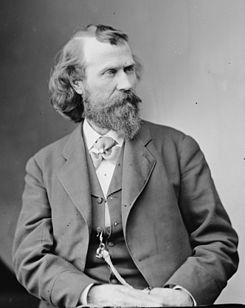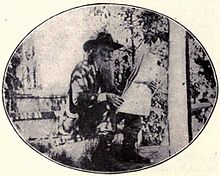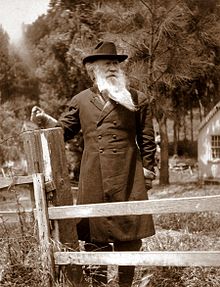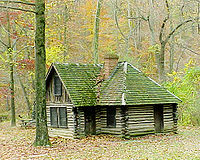- Joaquin Miller
-
Joaquin Miller 
Born Cincinnatus Hiner Miller
September 8, 1837Died February 17, 1913 (aged 75) Joaquin Miller was the pen name of the colorful American poet Cincinnatus Heine (or Hiner) Miller (September 8, 1837 - February 17, 1913), nicknamed the "Poet of the Sierras".
Contents
Biography
Early years and family
His parents were Hulen (sometimes "Hulings") Miller and Margaret Witt who married January 3, 1836 in Union County, Indiana. On September 8, 1837, their son Cincinnatus Hiner Miller was born near Liberty, Indiana.[1] Miller later changed his birth date to 1841 and said he was born on a wagon going west[2] while in Millersville, Indiana, a town he claimed was founded by his father. He also changed the date of his birth to November 10 for unknown reasons.[3] While a young boy, the Miller family moved to Oregon and settled in the Willamette Valley, establishing a farm in what would become Lane County. Accounts differ, giving the family's move to Oregon as early as 1842, but it was probably between 1850 and 1852.
As a young man, he moved to northern California during the California Gold Rush years, and had a variety of adventures, including spending a year living in a Native American village, and being wounded in a battle with Native Americans. A number of his popular works, Life Amongst the Modocs, An Elk Hunt, and The Battle of Castle Crags, draw on these experiences. He was wounded in the cheek and neck with an arrow during this latter battle, recuperating at the Gold Rush-era mining town of Portuguese Flat.
Wanderings and early writings
In the spring of 1857, Miller took part in an expedition against the Pit River Tribe after they killed a white man on Pit River.[4] Years later, he claimed that he had sided with the Native Americans and was run out of town for it.[5] About 1857, Miller supposedly married an Indian woman named Paquita (she may have been a Modoc Indian, and the relationship was probably that of a "country wife") and lived in the McCloud River area of northern California; the couple had two children born in California or Oregon. Spending a short time in the mining camps of northern Idaho, Miller found his way to Canyon City, Oregon by 1864 where he was elected the third Judge of Grant County. His old cabin in Canyon City is still standing.
Miller's exploits included a variety of occupations: mining-camp cook (who came down with scurvy from only eating what he cooked), lawyer and a judge, newspaper writer, Pony Express rider, and horse thief. On July 10, 1859, Miller was caught stealing a horse gelding valued at $80, a saddle worth $15, and other items.[6] He was jailed briefly in Shasta County for the crime, and various accounts give other incidents of his repeating this crime in California and Oregon.
Miller earned an estimated $3,000 working as a Pony Express rider, and used the money to move to Oregon. With the help of his friend, Senator Joseph Lane, he became editor of the Democratic Register in Eugene,[7] a role he held from March 15 to September 20, 1862.[8] Though no copies survive, it was known as sympathetic to the Confederacy until it was forced to shut down.[9] That year, Miller married Theresa Dyer (alias Minnie Myrtle) on September 12, 1862, in her home four days after meeting her[10] in Port Orford, Oregon. He had corresponded with her after exchanging poems with her for critique and chasing away a competing suitor.[11] The couple had two children.
In 1868, Miller paid for the publication of 500 copies his first book of poetry, Specimens.[12] It was unnoticed and Miller gave away more copies than he sold. Few have survived.[13] The author's despair and disappointment was reflected in his second book, Joaquin et al., the next year.[14]
Dyer filed for divorce on April 4, 1870, claiming they had a third child, Henry Mark, the year before and that Miller was "wholly" neglectful.[15] The court declared them divorced on April 19 and Dyer was granted custody of the baby while the two older children were left in the care of her mother. Miller was ordered to pay $200 per year in child support.[16] Miller believed the divorce prevented him from being nominated for a seat on the Oregon Supreme Court.[17] He never denied her charges that he was neglectful of her and their children and was rarely home.[18] He also may have had an affair with actress Adah Isaacs Menken shortly into the marriage.[19]
Travels
Miller had sent a copy of Joaquin, et al. to Bret Harte, who offered advice that he avoid "faults of excess" and encouragingly wrote, "you on your way to become a poet."[20] The next summer, July 1870, Miller traveled to San Francisco with borrowed money and there befriended Charles Warren Stoddard and Ina Coolbrith. Stoddard was the first to meet him at the dock and, as he recalled, Miller's first words to him were, "Well, let us go and talk with the poets."[21]
Miller went to England, where he was celebrated as a frontier oddity. There, in May 1871, Miller published Songs of the Sierras, the book which finalized his nickname as the "Poet of the Sierras".[22] It was well-received by the British press and members of the Pre-Raphaelite Brotherhood, particularly Dante Gabriel Rossetti and William Michael Rossetti.
While in England, he was one of the few Americans invited into the Savage Club along with Julian Hawthorne, son of Nathaniel Hawthorne. The younger Hawthorne referred to Miller as "a licensed libertine" but admitted him "charming, amiable, and harmless".[23] Rather abruptly, Miller left England in September 1871 and landed in New York. At the encouragement of family, he made his way to Easton, Pennsylvania to visit his brother on his death-bed before returning to Oregon; his father died shortly thereafter. Miller eventually settled in California, where he grew fruit and published his poems and other works.
In 1877, Miller adapted his First Fam'lies of the Sierras into a play, The Danites, or, the Heart of the Sierras. It opened on August 22 in New York with McKee Rankin as the main character.[24] The anti-Mormon play, which featured Danites hunting the daughter of one of the murderers of Joseph Smith, Jr., became one of the most commercially successful in a series of anti-Mormon dramas at the time. The Spirit of the Times, however, attributed its success to curious audience members expected a disastrous failure and instead discovering a good show: "The play proved to possess more than ordinary merit, and if it is not a great work, it is decidedly not a very bad one."[25] The Danites was extended from a run of only a few days to one of seven straight weeks before moving to another theatre and, ultimately, was performed to such a degree that it rivaled the popularity of Uncle Tom's Cabin.[26] It was published in book form later in 1877.[27] Miller later admitted that he regretted the anti-Mormon tone.[28]
Miller married for a third time on September 8, 1879, Abigail Leland, in New York, New York.
Later years and death
In 1886, Miller published The Destruction of Gotham, a book which was one of the earliest to depict a prostitute as a heroine.[2] That year, he moved to Oakland, California, and built a home for himself he called "The Hights". He remained there until his death in 1913.[29]
Japanese poet Yone Noguchi came to The Hights in 1894 and spent the next four years there as an unpaid laborer in exchange for room and board. While living there, he published his first book, Seen or Unseen; or, Monologues of a Homeless Snail (1897). Though he referred to Miller as "the most natural man", Noguchi reflected on those years as his most difficult in the United States and later fictionalized his experience in The American Diary of a Japanese Girl.[30]
In 1897, Miller traveled to the Yukon as a newspaper correspondent.[31] He saw Alaska for the first time on July 30.[32] His dispatches, many of which were written before reaching Alaska, incorrectly implied an easy and inexpensive trip. Miller himself nearly froze to death; two toes were lost to frostbite.[33]
Miller died on February 17, 1913, surrounded by friends and family. His last words were recorded as "Take me away; take me away!"[27] The poet had asked to be cremated by friends in the funeral pyre he built at The Hights with no religious ceremony and without being embalmed. His wishes were mostly ignored and the funeral on February 19 drew thousands of curious onlookers.[34] The preacher who spoke referred to Miller as "the last of America's great poets."[35] On May 23, members of the Bohemian Club of San Francisco and the Press Club returned to Miller's funeral pyre to burn the urn which contained his ashes, allowing them to scatter. He had left no will and his estate — estimated at $100,000 — was divided between his wife and daughter.[36]
Critical response and reputation
Miller was championed, although not enthusiastically, by Bret Harte and Ambrose Bierce. Bierce, who once called Miller "the greatest-hearted man I ever knew" also is quoted as saying that he was "the greatest liar this country ever produced. He cannot, or will not, tell the truth." Miller's response was, "I always wondered why God made Bierce."
Called the "Poet of the Sierras" and the "Byron of the Rockies", he may have been more of a celebrity in England than in his native U.S. Much of his reputation, however, came not from his poetry but from the image he created for himself by capitalizing on the stereotypical image of Western frontiersmen.[37] As poet Bayard Taylor bitterly noted in 1876, British audiences "place the simulated savagery of Joaquin Miller beside the pure and serene muse of Longfellow."[38] Critics made much of Miller's poor spelling and rhymes; he once rhymed "Goethe" and "teeth". Henry Cuyler Bunner satirized the error in a poem titled "Shake, Mulleary, and Go-ethe".[39] Miller himself once admitted, "I'm damned if I could tell the difference between a hexameter and a pentameter to save my scalp."[40]
The Westminster Review referred to Miller's poetry as "Whitman without the coarseness".[41] For a time, Miller's poem "Columbus" was one of the most widely known American poems, memorized and recited by legions of schoolchildren. Miller is remembered today, among other reasons, for lines from his poem in honor of "Burns and Byron":
- In men whom men condemn as ill
- I find so much of goodness still.
- In men whom men pronounce divine
- I find so much of sin and blot
- I do not dare to draw a line
- Between the two, where God has not.
Legacy
Joaquin Miller Cabin is located in Washington, DC. The Hights, the Oakland home Miller built at the end of his life, is currently known as the Joaquin Miller House and is part of Joaquin Miller Park. He planted the surrounding trees and he personally built, on the eminence to the north, his own funeral pyre and monuments dedicated to Moses, General John C. Frémont, and the poets Robert Browning and Elizabeth Barrett Browning. The Japanese poet Yone Noguchi began his literary career while living in the cabin adjoining Millers' during the latter half of the 1890s. The Hights was purchased by the city of Oakland in 1919 and can be found in Joaquin Miller Park.[42] It is now a designated California Historical Landmark.
List of works
- Specimens (1868)[27]
- Joaquin et al. (1869)[27]
- Pacific Poems (1871)
- Songs of the Sierras (1871)[43]
- Songs of the Sun-Lands (1873)[44]
- Life Amongst the Modocs (1873)[44]
- Arizonian (1874)[27]
- First Fam'lies of the Sierras (1875–76)[27]
- The One Fair Woman (1876)[27]
- The Baroness of New York (1877)[27]
- The Danites (1878)[27]
- Songs of Italy (1878)[27]
- The Destruction of Gotham (1886)
- Songs of the Soul (1896)[45]
- True Bear Stories (1900)[46]
- Chants for the Boer (1900)[46]
- The Complete Poetical Works of Joaquin Miller (1902)[46]
- As It Was in the Beginning (1903)[46]
- The Building of the City Beautiful (1905)[46]
- Light: A Narrative Poem (1907)[46]
- Joaquin Miller's Poems (1909–1910)[46]
- The Danites in the Sierras (1910)[46]
- 49: The Gold-Seekers of the Sierras (1910)[46]
- An Elk Hunt
- The Battle of Castle Crags
Notes
- ^ Frost, 11
- ^ a b Hapke, Laura. Girls Who Went Wrong: Prostitutes in American Fiction, 1885-1917. Popular Press, 1989: 21. ISBN 0879724749
- ^ Marberry, 1–3
- ^ Peterson, 37
- ^ Marberry, 23
- ^ Peterson, 40
- ^ Marberry, 44
- ^ Peterson, 50
- ^ Marberry, 45
- ^ Frost, 36
- ^ Marberry, 45–46
- ^ Marberry, 55
- ^ Frost, 55
- ^ Lewis, Nathaniel. Unsettling the Literary West: Authenticity and Authorship. University of Nebraska Press, 2003: 98. ISBN 0803229380
- ^ Frost, 44
- ^ Frost, 46
- ^ Peterson, 58
- ^ Marberry, 58–59
- ^ Marberry, 47–48
- ^ Nissen, Axel. Bret Harte: Prince and Pauper. University of Mississippi Press, 2000: 93–94. ISBN 9781578062539
- ^ Marberry, 64
- ^ Marberry, 93–94
- ^ Marberry, 85–86
- ^ Marberry, 158–159
- ^ Jones, Megan Sanborn. Performing American Identity in Anti-Mormon Melodrama. Taylor & Francis, 2009: 103. ISBN 9780415800594
- ^ Marberry, 159–160
- ^ a b c d e f g h i j Peterson, 179
- ^ Marberry, 160
- ^ "Alameda County". California Historical Landmarks. State of California Office of Historic Preservation. http://ohp.parks.ca.gov/default.asp?page_id=21388. Retrieved 6 May 2011.
- ^ Wyatt, David. Five Fires: Race, Catastrophe, and the Shaping of California. Oxford University Press, 1999: 188. ISBN 0195127412
- ^ Marberry, 237
- ^ Frost, 110
- ^ Marberry, 238–242
- ^ Marberry, 280–281
- ^ Frost, 112
- ^ Marberry, 282–283
- ^ Lewis, Nathaniel. Unsettling the Literary West: Authenticity and Authorship. University of Nebraska Press, 2003: 78. ISBN 0803229380
- ^ Loving, Jerome. Mark Twain: The Adventures of Samuel L. Clemens. University of California Press, 2010: 234. ISBN 9780520252578
- ^ Untermeyer, Louis. Modern American Poetry. New York: Harcourt, Brace and Company, 1921: 64.
- ^ Marberry, 90
- ^ Peterson, 66
- ^ "Alameda California Historical Landmarks". Office of Historic Preservation. http://ohp.parks.ca.gov/default.asp?page_id=21388. Retrieved November 2, 2005.
- ^ Peterson, 135
- ^ a b Marberry, 119
- ^ Peterson, 137
- ^ a b c d e f g h i Peterson, 181
References
- Frost, Orcutt William. Joaquin Miller. Twayne Publishers, 1967.
- Marberry, M. M. Splendid Poseur: Joaquin Miller—American Poet. New York: Thomas Y. Crowell Company, 1953.
- Peterson, Martin Severin. Joaquin Miller: Literary Frontiersman. Stanford University Press, 1937.
External links
- Bibliography of Joaquin Miller
- Chronology of Miller's life
- Biography from Literary Traveler
- Guide to the Joaquin Miller Papers at The Bancroft Library
- Joaquin Miller Park
- Poem by Miller in the Mount Shasta Collection
- 1905 Magazine Article with photos
- Works by Joaquin Miller at Project Gutenberg
- Joaquin Miller at Find a Grave
Categories:- 1837 births
- 1913 deaths
- American poets
- People from Oakland, California
- People from Grant County, Oregon
- Oregon state court judges
- Writers from California
- History of the San Francisco Bay Area
- American dramatists and playwrights
- Pony Express riders
- In men whom men condemn as ill
Wikimedia Foundation. 2010.



